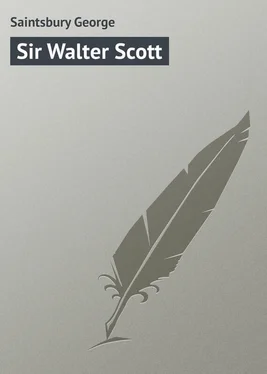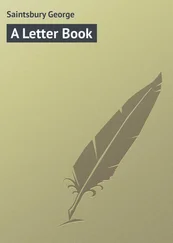George Saintsbury - Sir Walter Scott
Здесь есть возможность читать онлайн «George Saintsbury - Sir Walter Scott» — ознакомительный отрывок электронной книги совершенно бесплатно, а после прочтения отрывка купить полную версию. В некоторых случаях можно слушать аудио, скачать через торрент в формате fb2 и присутствует краткое содержание. Жанр: foreign_prose, на английском языке. Описание произведения, (предисловие) а так же отзывы посетителей доступны на портале библиотеки ЛибКат.
- Название:Sir Walter Scott
- Автор:
- Жанр:
- Год:неизвестен
- ISBN:нет данных
- Рейтинг книги:5 / 5. Голосов: 1
-
Избранное:Добавить в избранное
- Отзывы:
-
Ваша оценка:
- 100
- 1
- 2
- 3
- 4
- 5
Sir Walter Scott: краткое содержание, описание и аннотация
Предлагаем к чтению аннотацию, описание, краткое содержание или предисловие (зависит от того, что написал сам автор книги «Sir Walter Scott»). Если вы не нашли необходимую информацию о книге — напишите в комментариях, мы постараемся отыскать её.
Sir Walter Scott — читать онлайн ознакомительный отрывок
Ниже представлен текст книги, разбитый по страницам. Система сохранения места последней прочитанной страницы, позволяет с удобством читать онлайн бесплатно книгу «Sir Walter Scott», без необходимости каждый раз заново искать на чём Вы остановились. Поставьте закладку, и сможете в любой момент перейти на страницу, на которой закончили чтение.
Интервал:
Закладка:
These well-known translations, or rather imitations, the first published under the title of William and Helen , which it retains, the other as The Chase , which was subsequently altered to the better and more literal rendering, show unmistakably the result of the study of ballads, both in the printed forms and as orally delivered. Some crudities of rhyme and expression are said to have been corrected at the instance of one of Scott's (at this time rather numerous) Egerias, the beautiful wife of his kinsman, Scott of Harden, a young lady partly of German extraction, but of the best English breeding. Slight books of the kind, even translations, made a great deal more mark sometimes in those days than they would in these; but there were a great many translations of Lenore about, and except by Scott's friends, little notice was taken of the volume. There were some excuses for the neglect, the best perhaps being that English criticism at the time was at nearly as low an ebb as English poetry. A really acute critic could hardly have mistaken the difference between Scott's verse and the fustian or tinsel of the Della Cruscans, the frigid rhetoric of Darwin, or the drivel of Hayley. Only Southey had as yet written ballad verses with equal vigour and facility; and, I think, he had not yet published any of them. It is Scott who tells us that he borrowed
'Tramp, tramp, along the land they rode,
Splash, splash, along the sea,'
from Taylor of Norwich; but Taylor himself had the good taste to see how much it was improved by the completion —
'The scourge is red, the spur drops blood,
The fashing pebbles flee ' —
which last line, indeed, Coleridge himself hardly bettered in the not yet written Ancient Mariner , the ne plus ultra of the style. It must be mainly a question of individual taste whether the sixes and eights of the Lenore version or the continued eights of the Huntsman please most. But any one who knows what the present state of British poetry was in October 1796 will be more than indifferently well satisfied with either.
It was never Scott's way to be cast down at the failure or the neglect of any of his work; nor does he seem to have been ever actuated by the more masculine but perhaps equally childish determination to 'do it again' and 'shame the fools.' It seems quite on the cards that he might have calmly acquiesced in want of notoriety, and have continued a mere literary lawyer, with a pretty turn or verse and a great amount of reading, if his most intimate friend, William Erskine, had not met 'Monk' Lewis in London, and found him anxious for contributions to his Tales of Wonder . Lewis was a coxcomb, a fribble, and the least bit in the world of a snob: his Monk is not very clean fustian, and most of his other work rubbish. But he was, though not according to knowledge, a sincere Romantic; he had no petty jealousy in matters literary; and, above all, he had, as Scott recognised, but as has not been always recognised since, a really remarkable and then novel command of flowing but fairly strict lyrical measures, the very things needed to thaw the frost of the eighteenth-century couplet. Erskine offered, and Lewis gladly accepted, contributions from Scott, and though Tales of Wonder were much delayed, and did not appear till 1801, the project directly caused the production of Scott's first original work in ballad, Glenfinlas and The Eve of St. John , as well as the less important pieces of the Fire King , Frederick and Alice , etc.
In Glenfinlas and The Eve the real Scott first shows, and the better of the two is the second. It is not merely that, though Scott had a great liking for and much proficiency in 'eights,' that metre is never so effective for ballad purposes as eights and sixes; nor that, as Lockhart admits, Glenfinlas exhibits a Germanisation which is at the same time an adulteration; nor even that, well as Scott knew the Perthshire Highlands, they could not appeal to him with the same subtle intimacy of touch as that possessed by the ruined tower where, as a half-paralysed infant, he had been herded with the lambs. But all these causes together, and others, join to produce a freer effect in The Eve . The eighteenth century is farther off; the genuine mediæval inspiration is nearer. And it is especially noticeable that, as in most of the early performances of the great poetical periods, an alteration of metrical etiquette (as we may call it) plays a great part. Scott had not yet heard that recitation of Christabel which had so great an effect on his work, and through it on the work of others. But he had mastered for himself, and by study of the originals, the secret of the Christabel metre, that is to say, the wide licence of equivalence in trisyllabic and dissyllabic feet, 8 8 For an interesting passage showing how slow contemporary ears were to admit this, see Southey's excellent defence of his own practice to Wynn ( Letters , i. 69).
of metre catalectic or not, as need was, of anacrusis and the rest. As is natural to a novice, he rather exaggerates his liberties, especially in the cases where the internal rhyme seduces him. It is necessary not merely to slur, but to gabble, in order to get some of these into proper rhythm, while in other places the mistake is made of using so many anapæsts that the metre becomes, not as it should be, iambic, with anapæsts for variation, but anapæstic without even a single iamb. But these are 'sma' sums, sma' sums,' as saith his own Bailie Jarvie, and on the whole the required effect of vigour and variety, of narrative giving place to terror and terror to narrative is capitally achieved. Above all, in neither piece, in the less no more than in the more successful, do we find anything of what the poet has so well characterised in one of his early reviews as the 'spurious style of tawdry and affected simplicity which trickles through the legendary ditties' of the eighteenth century. 'The hunt is up' in earnest; and we are chasing the tall deer in the open hills, not coursing rabbits with toy terriers on a bowling-green.
The writing of these pieces had, however, been preceded by the publication of Scott's second volume, the translation of Goetz von Berlichingen , for which Lewis had arranged with a London bookseller, so that this time the author was not defrauded of his hire. He received twenty-five guineas, and was to have as much more for a second edition, which the short date of copyright forestalled. The book appeared in February 1799, and received more attention than the ballads, though, as Lockhart saw, it was in fact belated, the brief English interest in German Sturm und Drang having ceased directly, though indirectly it gave Byron much of his hold on the public a dozen years later. At about the same time Scott executed, but did not publish, an original, or partly original, dramatic work of the same kind, The House of Aspen , which he contributed thirty years later to The Keepsake . Few good words have ever been said for this, and perhaps not many persons have ever cared much for the Goetz , either in the original or in the translation. Goethe did not, in drama at least, understand adventurous matter, and Scott had no grasp of dramatic form. 9 9 His attempts at the kind may best be despatched in a note here. Their want of merit contrasts strangely with the admirable quality of the 'Old Play' fragments scattered about the novels. Halidon Hill (1822), in the subject of which Scott had an ancestral interest from his Swinton blood, reminds one much more of Joanna Baillie than of its author. Macduff's Cross (1823), a very brief thing, is still more like Joanna, was dedicated to her, and appeared in a miscellany which she edited for a charitable purpose. The Doom of Devorgoil , written for Terry in the first 'cramp' attack of 1817, but not published till 1830, has a fine supernatural subject, but hardly any other merit. Auchindrane , the last, is by far the best.
Интервал:
Закладка:
Похожие книги на «Sir Walter Scott»
Представляем Вашему вниманию похожие книги на «Sir Walter Scott» списком для выбора. Мы отобрали схожую по названию и смыслу литературу в надежде предоставить читателям больше вариантов отыскать новые, интересные, ещё непрочитанные произведения.
Обсуждение, отзывы о книге «Sir Walter Scott» и просто собственные мнения читателей. Оставьте ваши комментарии, напишите, что Вы думаете о произведении, его смысле или главных героях. Укажите что конкретно понравилось, а что нет, и почему Вы так считаете.












